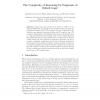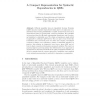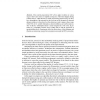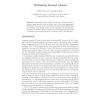105
Voted
SAT
2009
Springer
15 years 7 months ago
2009
Springer
112
click to vote
SAT
2009
Springer
15 years 7 months ago
2009
Springer
We introduce Cardinality Networks, a new CNF encoding of cardinality constraints. It improves upon the previously existing encodings such as the sorting networks of [ES06] in that ...
SAT
2009
Springer
15 years 7 months ago
2009
Springer
Abstract. We offer a new understanding of some aspects of practical SAT-solvers that are based on DPLL with unit-clause propagation, clause-learning, and restarts. On the theoreti...
123
Voted
SAT
2009
Springer
15 years 7 months ago
2009
Springer
One of the starting points of propositional proof complexity is the seminal paper by Cook and Reckhow [6], where they defined propositional proof systems as poly-time computable f...
109
click to vote
SAT
2009
Springer
15 years 7 months ago
2009
Springer
Default logic was introduced by Reiter in 1980. In 1992, Gottlob classified the complexity of the extension existence problem for propositional default logic as Σp 2-complete, an...
SAT
2009
Springer
15 years 7 months ago
2009
Springer
Different quantifier types in Quantified Boolean Formulae (QBF) introduce variable dependencies which have to be taken into consideration when deciding satisfiability of a QBF....
90
Voted
SAT
2009
Springer
15 years 7 months ago
2009
Springer
Most current propositional SAT solvers apply resolution at various stages to derive new clauses or simplify existing ones. The former happens during conflict analysis, while the l...
99
Voted
SAT
2009
Springer
15 years 7 months ago
2009
Springer
Minimizing learned clauses is an effective technique to reduce memory usage and also speed up solving time. It has been implemented in MINISAT since 2005 and is now adopted by mos...
SAT
2009
Springer
15 years 7 months ago
2009
Springer
Abstract. We define new encodings from Max-CSP into Partial MaxSAT which are obtained by modelling the at-most-one condition with the sequential SAT encoding of the cardinality co...
85
Voted
SAT
2009
Springer
15 years 7 months ago
2009
Springer
The concept of backdoor variables has been introduced as a structural property of combinatorial problems that provides insight into the surprising ability of modern satisfiability...




